
Artificial Intelligence (AI) has been around for decades. But never before has it seemed to threaten the very root of how humans acquire knowledge and skills to live and work, as when Generative AI technology, particularly ChatGPT, recently took the world by storm. And that’s when global debates on pros and cons were put on center stage to the extent that Elon Musk and thousands of others signed an open letter calling on AI labs around the world to pause the development of large-scale AI systems and jointly develop and implement a set of protocols for advanced AI design and development.
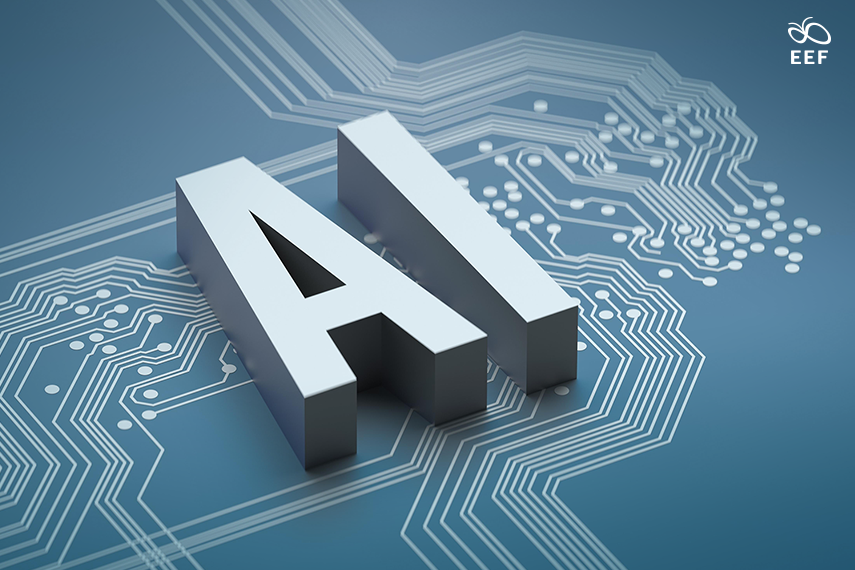
Trekees vs. Terminators
In a recent webinar titled “Empowering Teaching and Learning through AI” held by the Equitable Education Fund (Thailand), Prof. Dr. Anantha Duraiappah, the inaugural director of UNESCO MGIEP in New Delhi, interestingly made an analogy between two sci-fi movies: Star Trek and Terminator. The former is known for its optimistic vision of the future, space exploration, diplomacy, and complex moral dilemmas. The latter focuses on a dystopian future where self-aware AI launches a war against humanity.
The comparison aptly illustrated the beneficial and negative aspects of AI. The inaugural Director of the UNESCO-Mahatma Gandhi Institute of Education and Peace must be a Trekee, as he admitted that he was an optimist. He saw optimism in AI because he saw optimism in the human race. “That’s where the answer lies. That’s where AI will take us. It’s not about the AI itself, but it is about us. And remember, it is nothing but the creation of humans and the human brain. Nothing more, nothing less.”
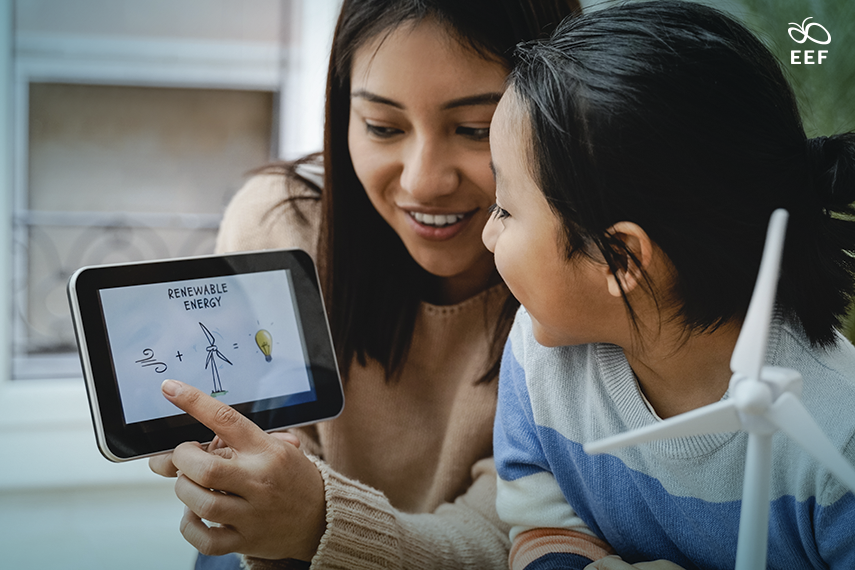
Education for Human Flourishing
Dr. Duraiuppah then abruptly, if not crash landing, brought the listeners back down to earth by bringing up some inconvenient statistics. One is that, according to the World Bank Learning Poverty Report, a global average of 70% of kids at the age of ten cannot read and comprehend a simple passage. And it is 23-25%, or one in every four, in Thailand. The other is that, according to UNICEF, one in every seven children between the ages of 10 and 19 has a mental health problem. Unfortunately, it is during this age of adolescence that learning happens the fastest. Poor mental health undoubtedly has a detrimental effect on their development.
Education, as stated in Article 26 of the Universal Declaration of Human Rights, shall be directed to the full development of human personality and to the strengthening of respect for human rights and fundamental freedoms, which Dr. Duraiuppah called “human flourishing”. But in reality, existing education has failed to achieve that goal. He blamed it on the one-size-fits-all approach, which “basically violates more than 90% of children that are in school today” by refusing to accept children’s learning differences. The story of his son with acute dyslexia dramatically drove his message home.
To add to the woes, a competitive exam-oriented system pitches students against each other. As such, the system is training predators rather than nurturers. By focusing on developing the child’s potential, the system creates an elitist system based on meritocracy, thereby creating an even more inequitable and unfriendly world.
AI… the Savior
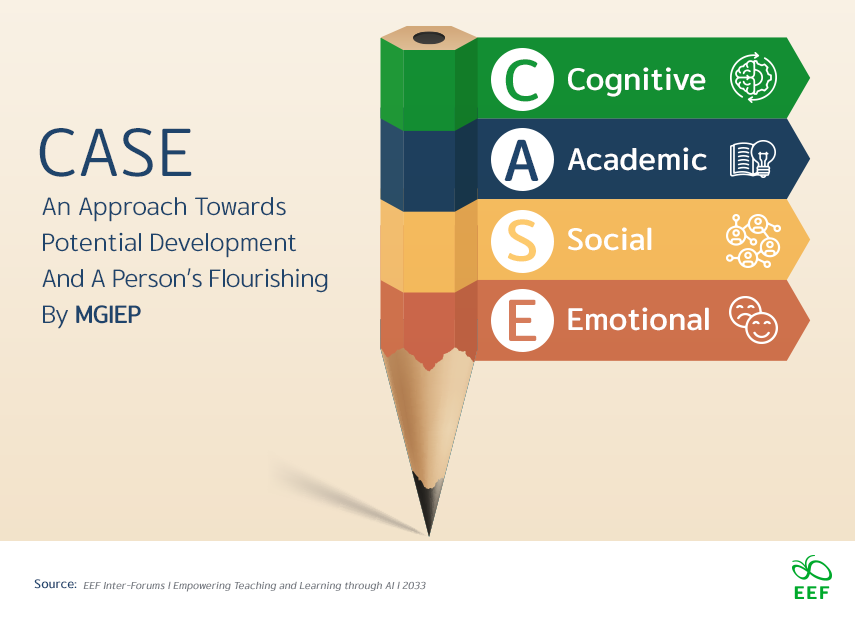
Yet, as a true Trekee, Duraiuppah saw how artificial intelligence can help fix the flaws in the education system. The International Science and Evidence-Based Education Assessment, developed over three years by MGIEP, proposed what is called CASE as an approach towards potential development and a person’s flourishing. C stands for Cognitive. A for Academic. S for Social and E for Emotional. To put this into action, a personalized education system is needed, which could only be made possible with the help of AI. In other words, AI is an essential tool to make personalized learning accessible to 1.8 billion young people around the world, where teachers and resources are limited.
The beauty of AI is that it is Efficient in terms of economy of scale and Effective in terms of personalization. It is also conducive to equitable learning on the assumption that everybody can connect to the internet and has a digital device. By stating that “If a kid does not have a digital device and access to the internet, it’s a violation of human rights in the modern day, which means governments are responsible and accountable to provide this”, Duraiuppah emphatically made his point.
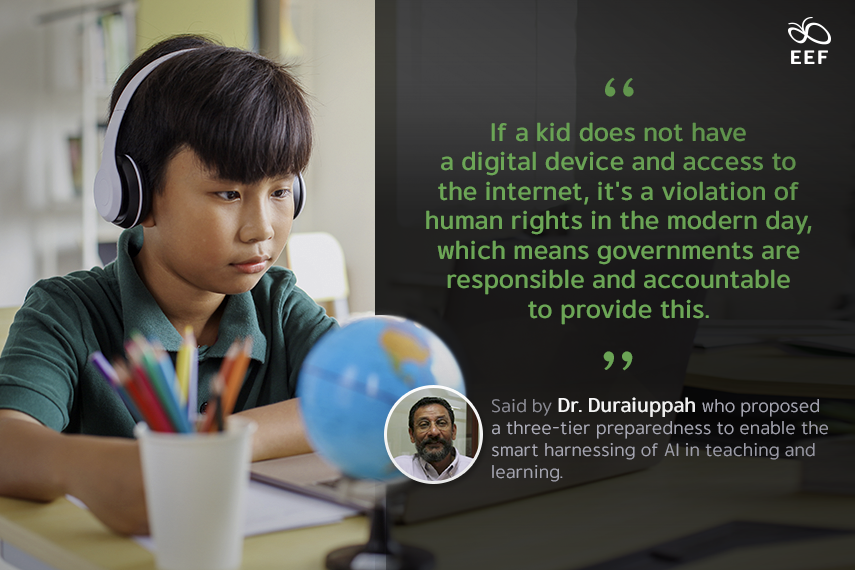
The ethical mindset
UNESCO has laid down ethical guidelines to provide a framework for the responsible and ethical use of AI in educational settings. Duraiuppah, however, opined that ethical guidelines are necessary but not sufficient. Being aware of the policies alone does not guarantee that a person will automatically have ethical behaviors. What matters, therefore, is the need to develop an ethical mindset in the long term, which means developing social and emotional competencies that form essential parts of an ethical mindset, such as empathy and compassion, to name just a few. Interestingly, AI has proven helpful in inculcating SEL through various digital platforms.
Dr. Duraiuppah called for a major rethinking of education. With the proliferation of AI in education, the notion of schools that we knew of, such as the physical structures, classrooms, equipment, and materials, became irrelevant and less applicable. The challenge is how to navigate mixed reality, where the physical and virtual worlds merge seamlessly. What is important is that AI should be used to serve the objective of providing personalized education with the potential and flourishing of students as the end goal.
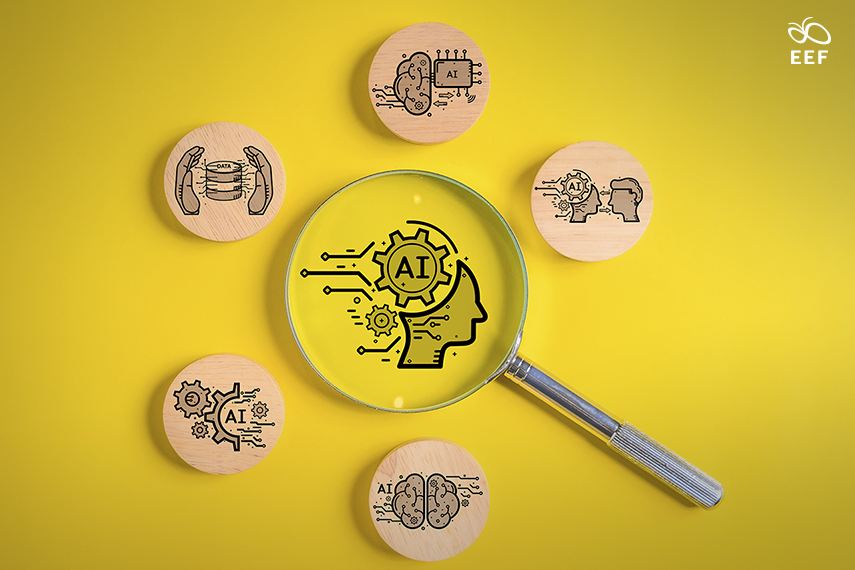
Harnessing AI in education
Dr. Duraiuppah proposed a three-tier preparedness to enable the smart harnessing of AI in teaching and learning. First of all, the preparedness of the educational system, which includes the selection of the right AI for different learning outcomes. Selected AI algorithms must be pre-audited against a certain set of ethical standards. But what is most important is for teachers to have social-emotional competencies such as emotion regulation, attention regulation, empathy for students, and compassion to help students, reiterated the man who is responsible for developing the Empathy, Mindfulness, Compassion, Critical Inquiry (EMC2) model—MGIEPs novel approach to Social and Emotional Learning.
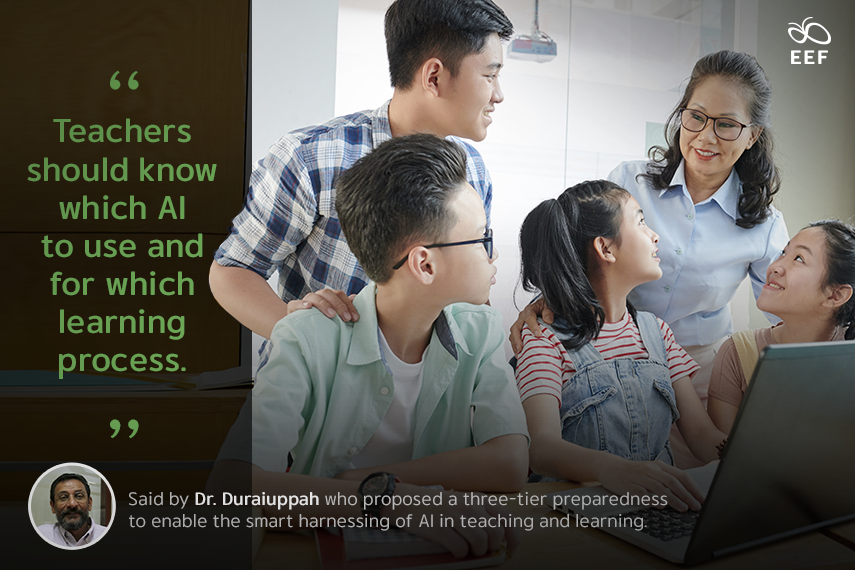
The second tier is the teacher’s preparedness. Teachers should know which AI to use and for which learning process. One of their key competencies must include an understanding of how to use the analytics coming out of the data to help the students. This is where the modern teacher comes in as more of a guide than a provider of information.
The third tier involves the students themselves. Apart from AI and AI ethics literacy, learners need to be inquisitive about knowledge and learn by asking a lot of questions. In an information-overloaded world, teachers need to teach students how to triangulate information and develop proactive critical thinking skills.
To substantiate his propositions and concretely demonstrate how to smartly harness AI technologies, he initiated and oversees the development of the Institute’s learning platform called FramerSpace (www.framerspace.com) to provide building blocks to support the creation of online courses and connect learners to peers and creators through artificial intelligence. FramerSpace is now being used across many countries.
Flourishing vs. Dystopian
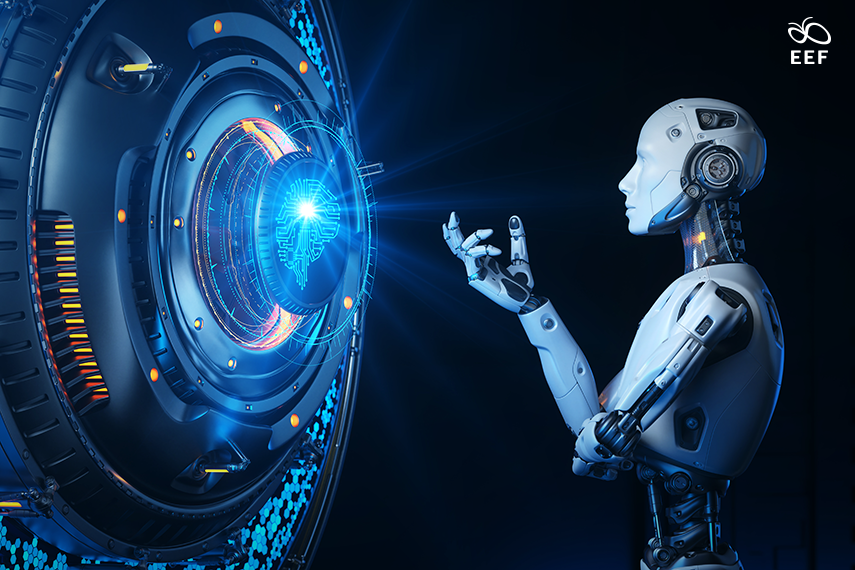
With AI omnipresent, whether or not the future of mankind will be flourishing or dystopian, it’s all up to us. As long as we keep in mind the purpose of education, we will stay on course towards the betterment of humanity. A dystopian future is avoidable if AI-empowered education aims towards learning experiences for human flourishing.
AI is here and now. It is inevitable. The co-chair of the International Science and Evidence-Based Education (ISEE) Assessment emphasized the need to pull together the best trans-disciplines, sciences, and evidence to navigate the challenges, with flourishing being the ultimate goal. The mechanism involves inter-governmental agencies, multi-stakeholders, and trans-disciplinary platforms that make decisions on a consensual basis to build an ethical mindset in the new generation.
“Then we know how to use AI for the betterment of humankind and allow AI to take us where no one has gone before“, concluded the advocate of personalized learning and AI for good.
Source: EEF Inter-Forums l Empowering Teaching and Learning through AI l 2033
Watch EEF Inter-Forums: https://web.facebook.com/watch/?v=1316689959224256

